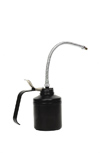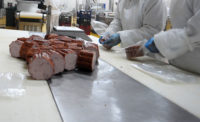
By Richard Mitchell, editor, Meat & Deli Retailer
Food-grade lubricants, one of the essential elements in protecting both machinery and proteins during the production process, are becoming more powerful.
Responding to the growing demand by meat producers for greases that can better withstand cleanings and operate under extreme conditions, developers are enhancing products that meet U.S. Department of Agriculture (USDA) regulations for use in plants where there is the possibility of incidental food contact and subsequent contamination.
Indeed, the performance levels of food-grade lubricants are getting closer to those of conventional greases, analysts say.
Products with synthetic base oil and recently developed thickeners, for instance, are enabling the lubricants to perform at increasingly wider temperature ranges.
While food-grade lubricants formulated with white oils typically could function at up to a temperature of 130 C, products with synthetic esters can be effective at up to 180 C, notes Chuck Coe, president of Grease Technology Solutions LLC, a Manassas, Va.-based consulting firm.
Greases also are better able to endure high-pressure water cleanings.
Coe notes that in recent years the water spray-off of some greases has been reduced nearly four-fold.
“There has been a lot of media coverage of contamination in meat plants and recalls of ground beef,” Coe states. “As a result, processors are looking to their grease suppliers for improved food-grade products.”
Though greases are getting stronger, processors also must adopt the most efficient lubricating schedules for optimal equipment performance.
Analysts recommend that plant engineers first follow the original equipment manufacturers’ lubricating guidelines, as well as generic calculations which often can be found on the Internet that take into account such elements as the size and rotating speed of bearings. But perhaps the most accurate source of data is workers with experience in maintaining the machinery.
“A good lubrication program features trained people who regularly monitor equipment and do not waste grease by lubricating too often, or cause equipment failure by not lubricating enough,” Coe notes. “There is a balance that must be recognized.”
Such operators also must be cognizant of the diverse requirements of specific machines. Lubricating schedules, for instance, often are dependent on the varying operating temperatures in different pieces of equipment and how frequently the equipment is running.
While some equipment needs to be lubricated several times a day, other machinery can be greased annually. Determining the appropriate consistency grades and performance levels of greases also is crucial for optimal efficiency.
Coe says original equipment manufacturers and suppliers typically are accurate sources of such data. To remain versed on the most appropriate products and ensure maintenance programs are ongoing, Coe says processors also should create internal monitoring teams.
“The biggest challenge to an effective program is the company mindset,” he states. “Smart and dumb management exists. Some companies think they will prosper by cutting corners and not lubricating as frequently as necessary, or using lesser-quality lubricants without considering the costs of equipment failure.”
Though demand is increasing for highly functional food-grade lubricants, the sector still is undergoing growing pains.
Coe notes, for instance, that synthetic-based oils often cost two to four times more than their mineral-oil counterparts. And because it is a relatively small segment of the overall grease sector estimated at less than 10 percent food-grade lubricants are not available from all suppliers. Nevertheless, Coe projects that demand for products will steadily increase over the next several years.
“Increasing concerns about food recalls will lead to growth,” he states.
Many meat processors already are making greasing a priority.
James Mock, plant engineer for Bronx, New York-based Mountain States Rosen LLC, says lubrication is part of the lamb processor’s Safe Food Quality (SFQ) practices.
Safe Food Quality is a global food safety and quality certification program and management system developed by the SQF Institute, a division of the Washington, D.C.-based Food Marketing Institute. It is intended to enable suppliers to assure their customers that food has been produced, processed, prepared and handled according to the highest possible standards.
Mountain States Rosen tracks the food-grade lubricants displaced during cleanings, and adjusts greasing frequencies accordingly, Mock notes.
“We can go from weekly to daily lubricating if necessary,” he says. “However, it is crucial not to over-lubricate to prevent greases, which can hold dirt and bacteria, from splattering on beltings and conveyors. There is a fine line between greasing just enough and contaminating equipment.”
Halperns’ Steak & Seafood, an Atlanta-based processor, leverages self-lubricating equipment for efficient greasing, says Chuck Van Dyke, production manager. The biggest challenge, he notes, is creating optimal lubricating schedules for newer machinery.
“There are more bells and whistles and turning gears as equipment is modernized,” Van Dyke says. “It is important to create check lists and not take lubricating for granted.”
Sioux-Preme Packing Co., a Sioux Center, Iowa-based pork processor, has two workers lubricating equipment for about two hours daily with battery-operated grease guns and air pumps, notes Rick Getman, plant engineer.
He adds that an aim is to grease machines as quickly as possible after cleanings to enable lubricants to displace water from machine bearings.




Report Abusive Comment